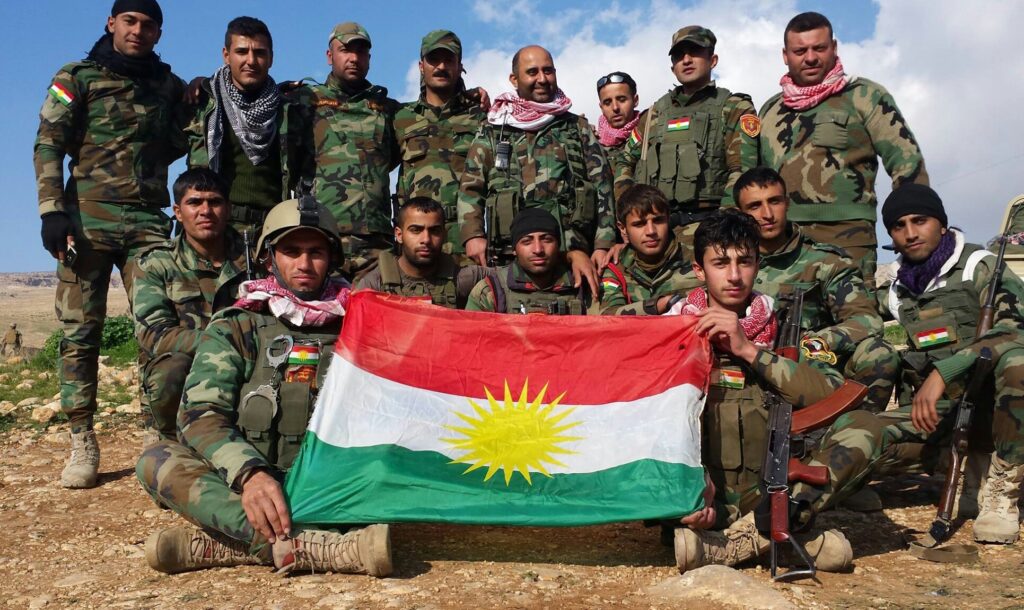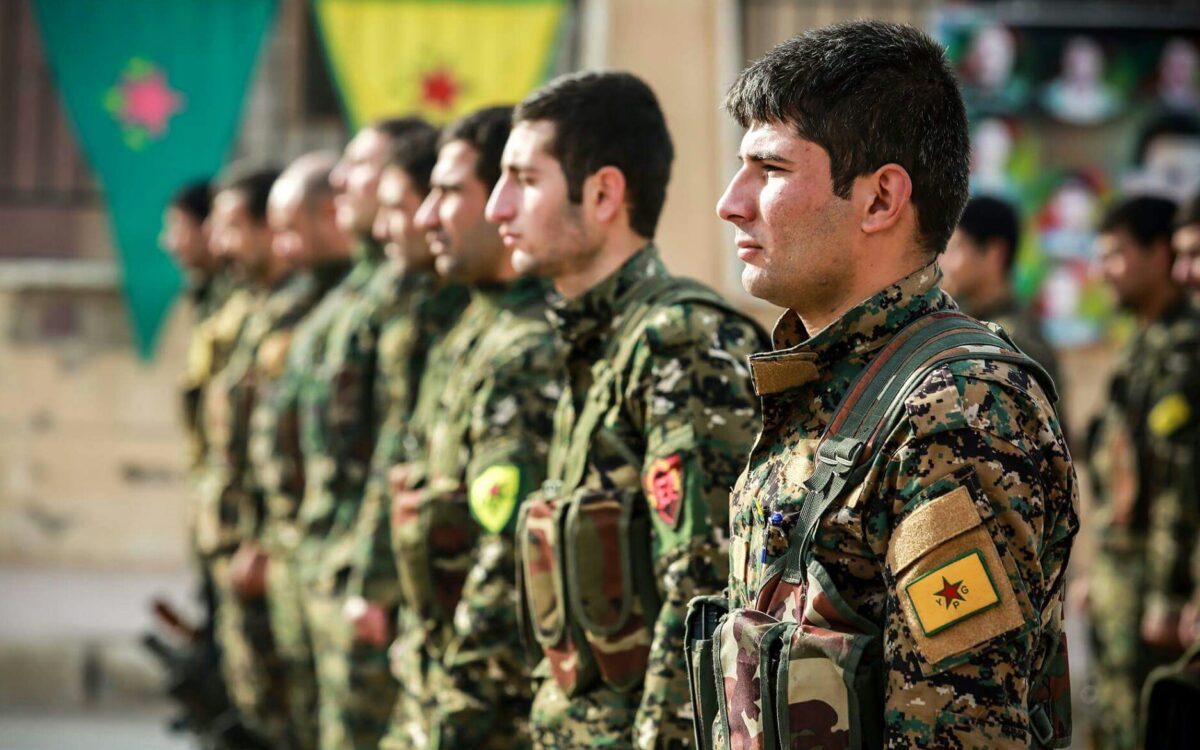
Edoardo Corradi
“How do events that happened far away from individuals push them to participate in civil wars? […] The power of emotions to mobilise foreign fighters, alone and together with ideology, requires further exploration.”
The continuously increasing number of foreign citizens participating in conflicts abroad has maintained academia’s interest in the phenomenon of foreign fighters. Yet, as Nicola Mathieson pointed out on this blog, our understanding of the phenomenon is far from complete.
This blog contributes to the Civil War Paths ‘Sustaining Peace‘ series in three ways: it shifts attention in our understanding of the phenomenon of foreign fighters armed mobilization from material to non-material factors; it brings qualitative data on the foreign fighters that joined the Kurdish People’s Protection Units against the Islamic State; and it shows the significance of emotions in mobilising transnational volunteers regardless of their ideological background.
Into the debate of armed mobilisation
Different theories have sought to explain local armed mobilisation in civil wars by looking at grievances, benefits resulting from mobilisation, economic factors, opportunities for rebellion, and perceived risks. A more recent and comprehensive approach considers civil war mobilisation as a social process involving pre-war dynamics in triggering armed mobilisation. Additionally, Stefano Costalli and Andrea Ruggeri shed light on the mobilising capacity of emotions and radical ideologies.
Recent conflicts, from Syria to Ukraine, sought a high level of participation by foreign fighters, or ‘non-citizens of conflict states who join insurgencies during civil conflicts’. Foreign fighters’ mobilisation widely varies from conflict to conflict. Existing literature on foreign armed mobilisation focuses on push and pull factors such as economic and social grievances, and ideational factors such as religion or ideology. However, a general approach explaining foreign armed mobilisation remains neglected despite the high level of academic attention that local armed participation has garnered.
Against this background, I argue that emotions and radical ideologies intersect to varying degrees in explaining foreign armed mobilisation. Transnational volunteers do not directly experience pre-war local dynamics that foster their armed mobilisation but instead decide to participate in a conflict outside their home country. While local civilians are more prone to participate in a conflict due to the absence of free riding, foreigners decide to join an armed group voluntarily. The role of emotions among foreign fighters is similar to James M. Jasper’s concept of ‘moral shock’. Jasper argues that individuals join a social movement regardless of pre-existing ties with it because some events may raise a moral outrage that leads to mobilisation.
But how do events that happened far away from individuals push them to participate in civil wars? Here, information is relevant in attracting foreigners to mobilise. As pointed out by David Malet, organisations recruit by ‘identifying a target audience, creating emotive responses over matters that may have previously seemed of little import, and reframing the message when initial approaches do not meet goals’. This information might be issued directly by a group, through their propaganda (as the Islamic State with the magasine Dabiq) or via newscasts, reports, TV channels, etc. Moreover, the information might be purposely used to attract individuals into their ranks or, unintentionally, against them.
I therefore argue that through exposure to information such as the ongoing conflict, the different armed actors involved, the atrocities committed by one or more groups, or the particular framing of information, foreigners may experience a sense of moral shock akin to the emotions described by Costalli and Ruggeri as mobilising forces among local fighters.

The role of emotions and radical ideologies in foreign fighters’ mobilisation
How do emotions and radical ideologies trigger foreign fighters’ mobilisation? To answer these questions, I interviewed 19 former foreign fighters from Italy, the United Kingdom, the United States, Denmark, and Ireland, who joined the Kurdish People’s Protection Units (YPG) and Women’s Protection Unit (YPJ) in Syria to fight against the Islamic State. Most of the participants (13) had a far-left background and were motivated by ideology and emotions. Among the other participants, who did not share the YPG ideology, emotions better explain their motivation.
Contrary to expectations, ideology on its own did not motivate foreign fighter mobilisation. In reality, ideologically motivated individuals, those with a far left or with explicit anarchist or communist backgrounds, were motivated by a combination of both ideology and emotions.
One individual, a European who fought in Syria for roughly six months, claimed he decided to join after the 2015 terrorist attacks in Paris. In his words, the combination of ideology and emotions pushed him to mobilise. Considering himself a communist, he stated, ‘let us suppose there had been the Bataclan and the only way to go and fight ISIS was to enlist in the Iraqi army or the Syrian army, I would never have left. […] If I had not been a communist, in the inverted commas that this term in my opinion provides, I would not have left anyway. Instead, the Bataclan played, if anything, a fundamental role in making me really decide to go’. Ideology was significant in motivating him to join the Syrian conflict, while emotions, the indignation after the terrorist attack in Paris, triggered him to join the Kurds.
On the contrary, emotions sufficiently triggered those without an ideological affinity. For example, an Irish combatant who previously served in the army and without any ideological affinity with the YPG and YPJ stated, ‘for me, it was an emotional reaction thing […] [a] combination of several things, but seeing the propaganda shocked me, horrified me, and the lack of action from the international community, something I couldn’t really understand or kind of comprehend’.
An American former YPG volunteer from Sacramento, when he was describing to me his main motivations, pointed out, ‘it actually had to do with a few photos I saw. I got kids. I have, like, a soft spot for kids, man. I saw a picture of a Yezidi baby, and the baby had, like, five AK 47 muzzles pointed at the baby. And there were Islamic State fighters, and they were pointing the guns at this little baby, but the baby was looking up, like, smiling, almost like the baby didn’t understand. And that shit just crushed my heart, man. That crushed my heart’.
Conclusion
Non-material factors played a key role in motivating these individuals to join the People’s Protection Units and the Women’s Protection Unit in Syria. Where Costalli and Ruggeri claim that emotions are important within the same community, my research similarly shows that these non-material factors increase the likelihood of foreign fighters’ mobilisation in civil wars. Moreover, ideological affinity has not been, for many, a sufficient reason to fight, while the combination of radical ideology and emotions has served as the main motivation for these individuals to join. Media and propaganda have played a key role in attracting individuals to fight with and against a certain group.
The power of emotions to mobilise foreign fighters, alone and together with ideology, requires further exploration. What draws foreign fighters to participate in particular conflicts and not others? For instance, the ongoing war in Ukraine has mobilised many foreign volunteers. Further research should address the role of emotions and ideology in triggering foreign armed mobilisation in this and other contexts to deepen understandings of why foreigners join armed conflicts abroad and to understand the role of information and propaganda in eliciting emotions and attracting foreigners to participate in particular conflicts.

